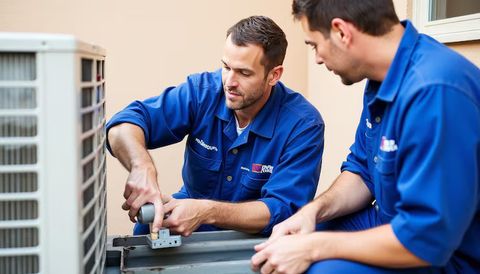AC Repair and Maintenance Explained: Insights, Facts, and Practical Advice
Air conditioning (AC) systems are essential appliances in homes, offices, and commercial spaces. They regulate indoor temperatures, improve air quality, and provide comfort during hot weather. Like any mechanical system, AC units require regular maintenance and occasional repairs to function efficiently.
AC repair and maintenance exist because these systems are complex, consisting of parts such as compressors, condensers, evaporator coils, filters, and thermostats. Over time, dust buildup, wear and tear, and refrigerant leaks can reduce performance. Regular upkeep prevents costly breakdowns, lowers energy consumption, and extends the lifespan of the unit.

Importance
Maintaining and repairing AC systems matters today for several reasons. It affects homeowners, businesses, landlords, tenants, facility managers, and even governments monitoring energy usage.
Why it matters:
-
Energy efficiency: Poorly maintained units consume more electricity, leading to higher bills.
-
Health and comfort: Clean filters and coils reduce allergens, dust, and humidity problems, contributing to better indoor air quality.
-
Cost prevention: Routine servicing reduces the risk of sudden breakdowns that require expensive repairs or replacements.
-
Environmental impact: Efficient systems reduce energy waste and limit harmful refrigerant leaks that contribute to global warming.
Who it affects:
-
Households relying on AC for summer comfort.
-
Businesses such as retail stores, restaurants, and offices where cooling is crucial for employees and customers.
-
Landlords and property managers maintaining building systems.
-
Technicians and service providers working in repair and maintenance industries.
Problems it solves:
-
Frequent malfunctions or reduced cooling capacity.
-
Rising electricity bills from inefficient systems.
-
Indoor air issues such as dust, mold, or excess humidity.
-
Shortened AC lifespan due to neglect.
Recent Updates
The past year (2024–2025) has seen significant developments in AC repair and maintenance practices:
-
Smart monitoring systems: In 2024, more manufacturers introduced ACs with built-in sensors that alert homeowners when filters need cleaning or when refrigerant levels drop.
-
Shift to eco-friendly refrigerants: Following global agreements, many AC units now use refrigerants with lower global warming potential (GWP). In 2024, R-32 and R-454B became more common replacements for older R-410A systems.
-
AI-powered diagnostics: Some HVAC companies began adopting AI-driven diagnostic tools in 2024, which help technicians quickly identify system faults.
-
Energy efficiency standards: In January 2023, the U.S. Department of Energy implemented new SEER2 standards (Seasonal Energy Efficiency Ratio), and updates in 2024 continued driving more efficient equipment into the market.
-
Rising service demand: Heatwaves across Europe, Asia, and North America in 2024 increased demand for both installation and maintenance services, highlighting the importance of preparedness.
Laws or Policies
AC repair and maintenance are regulated by policies that aim to ensure safety, efficiency, and environmental responsibility.
-
United States:
-
The Clean Air Act requires proper handling and disposal of refrigerants to prevent ozone depletion.
-
EPA Section 608 Certification is mandatory for technicians working with refrigerants.
-
Energy standards such as SEER2 regulations (2023–2024) influence which units can be sold and installed.
-
-
European Union:
-
The F-Gas Regulation (last updated in 2024) limits the use of high-GWP refrigerants and requires proper recovery during servicing.
-
Strict energy labeling rules ensure consumers know the efficiency ratings of AC units.
-
-
Asia-Pacific:
-
Countries like Japan and Singapore have introduced incentive programs for switching to energy-efficient units.
-
In India, the Bureau of Energy Efficiency sets star ratings for AC efficiency, and compliance is mandatory for sales.
-
-
Local bylaws: Many regions enforce rules on technician licensing, noise levels of outdoor units, and safe disposal of old equipment.
These laws not only affect how technicians carry out repairs but also guide consumers in selecting and maintaining compliant systems.
Tools and Resources
A range of tools, apps, and resources can support both professionals and homeowners in AC repair and maintenance.
| Category | Examples | Use Case |
|---|---|---|
| Diagnostic tools | Multimeters, refrigerant gauges, thermal imaging cameras | Checking electrical faults, refrigerant levels, and leaks |
| Cleaning tools | Coil cleaning sprays, fin combs, wet/dry vacuums | Regular maintenance of coils, fins, and filters |
| Smart monitoring | Nest Thermostat, Ecobee, manufacturer apps | Track energy use, schedule servicing reminders |
| Calculators & guides | SEER calculators (DOE website), HVAC load calculators | Estimate energy savings and proper AC sizing |
| Educational resources | EPA HVAC certification resources, industry training platforms | Guidance for technicians and homeowners |
Other resources:
-
Online communities: Forums such as HVAC-Talk provide troubleshooting insights.
-
Apps: Some service companies offer apps to schedule appointments, track service history, and receive maintenance alerts.
-
Templates: Printable maintenance checklists help homeowners track tasks like filter replacement or coil cleaning.
FAQs
Q1. How often should I service my AC?
Most experts recommend professional servicing at least once a year, typically before the summer season. Filters should be checked monthly and cleaned or replaced as needed.
Q2. What are signs that my AC needs repair?
Common signs include reduced cooling, unusual noises, foul odors, water leaks, or unusually high electricity bills.
Q3. Can I perform AC maintenance myself?
Yes, basic tasks such as cleaning filters, ensuring outdoor units are debris-free, and checking thermostat settings can be done at home. However, handling refrigerants or electrical issues should be left to certified professionals.
Q4. Does regular maintenance really save money?
Yes. A well-maintained unit runs more efficiently, which reduces energy bills. It also helps avoid costly emergency repairs by catching problems early.
Q5. What refrigerant does my AC use, and why does it matter?
Older units may use phased-out refrigerants like R-22, which are no longer produced due to environmental concerns. Newer units use eco-friendly alternatives such as R-32 or R-454B, which are more efficient and environmentally responsible.
Conclusion
AC repair and maintenance are not just about keeping systems running—they are about ensuring comfort, efficiency, and sustainability. With technological advances, eco-friendly refrigerants, and stricter regulations, the way we maintain and repair air conditioners continues to evolve.
By staying informed about recent updates, following local policies, and using the right tools, homeowners and businesses can extend the life of their systems, lower costs, and reduce environmental impact. A consistent approach to maintenance ensures that AC units remain reliable, safe, and efficient for years to come.






